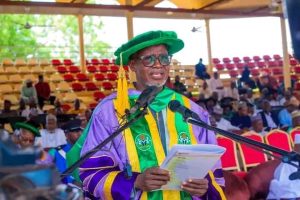By: Abdulrasaq Kamaldeen

The Students of Usmanu Danfodiyo University, Sokoto (UDUS) lauded the legacy of Professor Lawal Sulaiman Bilbis as he concluded his tenure as the university’s Vice-Chancellor.
Professor Bilbis’s leadership has been a song of celebration and honor among Danfodiyo students— reacting to his contribution to the university community.
Recalling, that on Monday, July 29, 2024, Professor Lawal Bilbiss’s term as Vice Chancellor of Usmanu Danfodiyo University officially came to an end.
Mustapha Usman, a 400-level student of History and International Studies, is among those who praised Professor Bilbis’s impact as he stepped down from his office.
Usman stressed the state of UDUS University when he gained admission on January 14, 2020— saying that while the infrastructure was quite developed, Professor Bilbis’s tenure added considerably to it.
Maintaining his words, Usman testified to the transformative nature of Professor Bilbis’s administration.
“When I got admission, I met ongoing projects across the university community which Professor Bilbiss tried and completed and even went beyond the existing projects,” he said.
Speaking further, Usman noted the development in the division of the Faculty of Science into the Faculty of Chemical and Life Sciences and the creation of new faculties such as the Faculty of Physical and Computing Sciences and the Faculty of Arabic and Islamic Studies.
“ Part of the development is the solar power systems installed across the university and student hostels, and construction of the new UDUS Senate building is underway.”
Professor Bilbiss’s Academic Career at Fodiyo
An indigene of Tsafe in Magazu Village, Zamfara State, Nigeria, Professor Bilbiss held a B.Sc. in Biochemistry from Usmanu Danfodiyo University (1986) and a Ph.D. in Biological Chemistry from the University of Essex, England (1992).
Born in 1961, Professor Bilbis was an educator and lecturer in the Department of Biochemistry at Usmanu Danfodiyo University before he was appointed Vice-Chancellor.
He began his academic career as an Assistant Lecturer at UDUS in 1988 and has since held various positions, including Head of the Department of Biochemistry, Dean of the Faculty of Science, Deputy Vice-Chancellor (Academics), and Director of the University Development Office.
He became a Professor of Biochemistry at UDUS in 2002. Before his role as Vice-Chancellor, Professor Bilbis served as the Deputy Vice-Chancellor (Academics) at UDUS and was the pioneer Vice-Chancellor of the Federal University, Birnin Kebbi, in 2013.
Serving as the 9th Vice-Chancellor since his appointment on July 11, 2019, he led the university through five years of notable progress and achievements.
Introduction of new Courses during Professor Bilbiss’s Tenure
Speaking on some of the progress brought by Professor Bilbiss’s tenure, Usman noted that several new courses were introduced, including B.A. Qur’an, B.A. Hadith, B.A. Shari’ah, Doctor of Optometry, Demography, Peace and Conflict Studies, Education Computer Science, Education Agriculture, Educational Management, Guidance and Counseling, and Library and Information Science.
He added, “When I was in the 100 level, UDUS had held fewer than 20 inaugural lectures in its history. During his tenure, that number exceeded 40.”
Legacy, Personal Attributes
In an interview with Khaleefarh Abdullahi Donna, a 300-level History and International Studies student, praised the outgoing VC.
“Professor Bilbis is a scholar who did his utmost best in leading UDUS, putting it on the map of modern universities with many infrastructural developments and academic enhancements.
“ He is a leader by example, a scholar by nature, a teacher by passion, and a father to all. He will be forever missed for his intelligence, integrity, dignity, morals, and values.”
Zakariyah Abdulwaheed, a graduate of Education and Extension Services, said, “UDUS is not only the most peaceful university in Nigeria but also one of the hardest. During his tenure, Professor Bilbis significantly improved the infrastructure, making him beloved by many students.”
“He also frequently checked lecture rooms to ensure lecturers were present, which motivated them to deliver quality lectures. He is a jovial man and very approachable,” she added.
